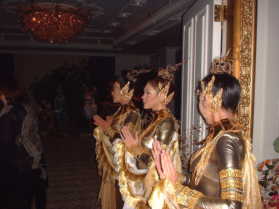
Why are these festivals so popular? To answer this question we can look at the role model for all film festivals - Cannes. Itís awards are highly regarded, it attracts a high calibre of films for competition and screening, it provides a marketplace for doing deals and it is glamorous location that offers ample opportunity for stars (or wannabe stars) to show-off themselves and their latest releases.
Cannes is the perfect combination of showbiz, culture, art, and film finance - everyone is happy except for those of us who canít find or afford a hotel room within a fifty mile radius of the place. You definitely have to plan well in advance if you plan on attending this event. The amount of money that you could spend there could be extensive, and your plans may be changed at any moment due to the star power that may be attending.
It is hard to imagine how bikinis on the beach and prestigious film awards were able to evolve side-by-side in Cannes. On the other hand we have to remember that it was the French who gave us the tools and terminology for film criticism, based on an admiration for mainstream Hollywood movies.
Not many festivals have the clout or high profile of Cannes and many do not want itís glitzy trappings. A case in point is Robert Redfordís Sundance Film Festival. It is the showcase for independent filmmakers, where agents are busy looking out for the next low-budget high-profit hit. It is the place for new talent to be discovered. Not all films entered into this festival will have the same budgeting. Some are going to be a lot more expensive than others, but they are all critiqued on the quality of the film itself. Not just on the budgeting that was used to complete it.
Yet, every year the Sundance festival has problems with itís own success. Film companies can highjack it by flying in a handful of stars to launch a new film knowing it will get lots of publicity at Sundance and beyond. When this happens the streets of Park City, Utah, where the festival is held, become blocked by stars, their extensive entourage of friends and employees, photographers and crowds fighting to get a glimpse of celebrity in the flesh. If it wasnít so cold there would be bikinis everywhere.
Another factor at Sundance is that Hollywood stars come here to get out of the rut of mainstream movies or to revive a flagging career. Ironically, they want to feed from the fresh talent that their star presence is likely to scare away.
Like Sundance, Cannes began as a small festival in 1946 and for a few years it was possible to bump into and interview stars along La Croisette. Now it gets up to 50,000 visitors and world-wide TV coverage. Although itís awards are still respected, partly because they donít always go for the obvious, it does now depend more on Hollywood stars to appear to appease the mass audience.
In turn, Cannes can be literally an ego-trip for some stars. Arnold Schwarzenegger, for example, stole the limelight by making a grand entrance to Mike Leighís Naked when it was screened in competition in 1993. This was bad enough, but when the film started Arnie disappeared. Obviously desperate to get the maximum publicity for Last Action Hero, a giant inflatable model of him was floated in the harbour. Obviously feeling no shame at all, exactly ten years later, he returned to Cannes to promote Terminator 3 with two lavish parties (for some reason I didnít get an invite to either).
In 1998 Bruce Willis sailed into Cannes and showed an invited audience of critics a work-in-progress of Armageddon. The audience laughed at what was meant to be a serious drama, and Willis resorted to saying the critics didnít matter because no-one read them anyway. Ouch!
James Christopher brings this up in his preview of the 56th Cannes Film Festival (2003):
ĎThere are perennial mutterings about the ease with which Cannes is highjacked by hype and Hollywood. Frankly it wouldnít be so madly attractive if it was left to its own devices.íSo if you are organising a film festival you need stars to gain publicity, attract audiences and give sparkle to the proceedings but you donít want them to completely eclipse your event either. Cannes is just about big enough to embrace them; lesser festivals might find them detracting from the real purpose of the event.
(ĎLights, Cameras, Not Much Actioní. The Times, T2, 15 May, 2003, page 15)
First of all you have to decide the prime purpose of your festival. It might celebrate international or national cinema, or a specific genre or theme.
The location of the event is important in terms of providing suitable cinemas, hotels and meeting places within close proximity, and it should be attractive enough to attract festival-goers from far and wide.
Timing is also an important consideration as your festival might clash with others with similar objectives and you might not be able to get the films, crowds, publicity or stars needed to run the event successfully.
Having considered all these variables there is always the unexpected. Events in the Ďrealí as opposed to Ďreelí world can change or cancel your event. In the case of Cannes it was meant to begin in 1939, to challenge the fascist-influenced Venice Film Festival, but the Second World War put the block on it. Ironically, the 2003 Berlin Film Festivalís awards ceremony got eclipsed when a huge rally took to the cityís streets to protest against a war in Iraq. The stars at the festival were also verbose in their anti-war statements, and the films had to take a back-seat.
 These factors came to mind when I attended the 5th Bangkok International Film Festival, which ran from January 10 to 21, 2003. This was a lavish affair that screened more than 100 international films, it celebrated the work of Agnes Varda, it incorporated an animation festival, it held workshops on Asian film financing and digital movies, it had a poster exhibition, a stunt show, a celebrity golf tournament, a concert by Maurice Jarre, star-studded opening and closing ceremonies, and the introduction of The Golden Kinnaree Awards.
These factors came to mind when I attended the 5th Bangkok International Film Festival, which ran from January 10 to 21, 2003. This was a lavish affair that screened more than 100 international films, it celebrated the work of Agnes Varda, it incorporated an animation festival, it held workshops on Asian film financing and digital movies, it had a poster exhibition, a stunt show, a celebrity golf tournament, a concert by Maurice Jarre, star-studded opening and closing ceremonies, and the introduction of The Golden Kinnaree Awards.
The chairman of this festival, and Deputy Prime Minister, H. E. Mr. Korn Dabbaransi, notes in the festivalís film catalogue that he hoped this event Ďwill help Thailand make further advances in the world of film-making and also diversify our portfolio of tourism attractions, thereby bringing more visitors to Thailand.í
In the light of this the festival was designed as a flagship as much for tourism as for promoting Asian or world cinema. From the list of screenings and events hosted during the festival it shows that they also had many other objectives in mind. The Golden Kinnaree Awards, the Agnes Varda retrospective and the other screenings showed that they are serious about promoting film culture in general and in providing their own film-makers and audiences with inspiration. Here they had some difficulty in getting international films entered into the Kinnaree competition, especially since entries had to have English sub-titles provided with them.
 Besides getting suitable films for the festival they had trouble attracting big film stars to the event. This was mainly due to the event being fairly new and that this year it clashed with The Golden Globe awards. Unlike the Sundance Festival, Bangkok wants the glitz as well as the culture. In future they might hold the festival earlier in the year to avoid this clash. From a tourist point-of-view I think the festival worked perfectly. Having never visited the city I was impressed by the modern cinema complexes, the food, the politeness of the people, the shopping malls, the temples, and palaces and the sheer scale of the place. It is a young and vibrant place, which wants to be at the centre of Asian film-making and culture. Despite a few minor difficulties the festival organised a wide-range of events to a very high standard.
Besides getting suitable films for the festival they had trouble attracting big film stars to the event. This was mainly due to the event being fairly new and that this year it clashed with The Golden Globe awards. Unlike the Sundance Festival, Bangkok wants the glitz as well as the culture. In future they might hold the festival earlier in the year to avoid this clash. From a tourist point-of-view I think the festival worked perfectly. Having never visited the city I was impressed by the modern cinema complexes, the food, the politeness of the people, the shopping malls, the temples, and palaces and the sheer scale of the place. It is a young and vibrant place, which wants to be at the centre of Asian film-making and culture. Despite a few minor difficulties the festival organised a wide-range of events to a very high standard.
The Bangkok festival is still finding itís way and trying to establish itself as a serious and rewarding event for film-makers and audiences. Since it is trying to work on a national and international level it does have a difficult juggling act on itís hands, even though it does have the skills and infra-structure to be a world-leading festival.
To come to terms with the same kind of issues in Europe there is the European Coordination of Film Festivals organisation, which is supported by 130 film festivals. This organisation aids coordination between festivals and highlights their interests when the European Parliament makes any related policy decisions. They also have the aim of promoting European cinema and raising public awareness. (See their website: http://www.eurofilmfest.org/)
With Internet, TV, DVD and the rest of the new telecommunications technology available you donít have to drag people to any film festivals at all, but such a radical solution would take all the fun out of seeing films and their stars.
http://www.braindumps.com/OG0-092.htm
http://www.actualtests.com/exam-70-680.htm
http://www.test-king.com/training/pmp-prep.htm
|
|